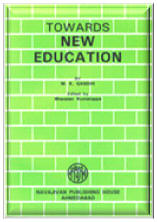
P.O. SEVAGRAM, DIST.WARDHA 442102, MS, INDIA. Phone: 91-7152-284753
FOUNDED BY MAHATMA GANDHI IN 1936
Towards New Education

TOWARDS NEW EDUCATION
Written by :M. K. Gandhi
Table of Contents
- PART I : INADEQUACY OF PREVAILING EDUCATION
- PART II : FORESHADOWING OF A NEW TYPE OF EDUCATION
- PART III : NEW EDUCATION
- PART IV : THE QUESTION OF RELIGIOUS EDUCATION
- PART V : THE LANGUAGE PROBLEM
- PART VI : COMPULSORY EDUCATION
- PART VII : EDUCATION OF SPECIAL GROUPS
- PART VIII : HIGHER EDUCATION
- Glossary
About This Book
Written by : M. K. Gandhi
Edited by : Bharatan Kumarappa
First Edition : October 1953
I.S.B.N : 81-7229-078-0
Printed and Published by : Jitendra T. Desai
Navajivan Mudranalaya,
Ahmedabad - 380 014,
India.
© Navajivan Trust, 1953
Download
PART VI : COMPULSORY EDUCATION
Compulsory Education
I am not quite sure that I would not oppose compulsory education at all times. All compulsion is hateful to me. I would no more have the nation become educated by compulsion than I would have it become sober by such questionable means. But just as I would discourage drink by refusing to open drink shops and closing existing ones, so would I discourage illiteracy by removing obstacles in the path and opening free schools and making them responsive to the people's needs. But at the present moment we have not even tried on any large scale the experiment of free education. We have offered the parents no inducements. We have not even sufficiently or at all advertised the value of literacy. We have not the proper school-masters for the training. In my opinion therefore it is altogether too early to think of compulsion. I am not even sure that the experiment in compulsory education has been uniformly successful wherever it has been tried. If the majority wants education, compulsion is wholly unnecessary. If it does not, compulsion would be most harmful. Only a despotic Government passes laws in the teeth of the opposition of a majority. Has the Government afforded full facilities for education to the children of the majority ? We have been compulsion-ridden for the past hundred years or more. The State rules our life in its manifold details without our pervious sanction. It is time to use the nation to voluntary methods even though for the time being there may be no response to prayers, petitions and advice addressed to the nation. It has had little response to its prayers. Nothing is more detrimental to the true growth of society than for it to be habituated to the belief that no reform can be achieved by voluntary effort. A people so trained become wholly unfit for Swaraj.
It follows from what I have said above that if we get Swaraj today I should resist compulsory education at least till every effort at voluntary primary education has been honestly made and failed. Let the reader not forget that there is more illiteracy in India today than there was fifty years ago, not because the parents are less willing but because the facilities they had before have disappeared under a system so foreign and unnatural for the country.
It is not reasonable to assume that the majority of parents are so foolish or heartless as to neglect the education of their children even when it is brought to their doors free of charge.
Young India, 14-8-1924